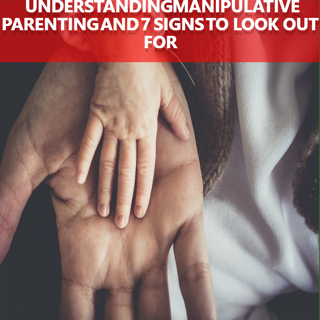
INTRODUCTION
Be on the lookout for the following manipulative parenting behaviors, as these can affect a child's life and future relationships. Early detection of such signs is essential for corrective measures and injury prevention. This article will discuss seven such indicators of manipulative parenting and how to manage them effectively.
UNWARRANTED GUILT TRIPS
One of the ways manipulative parenting is usually shown to the child involves unwarranted guilt trips to control the behavior of the child. This may be seen when such parents say, "If you love me, you will do this for me." Such children always feel responsible for their parents' emotions and may ultimately feel guilty or confused.
GASLIGHTING AND DENIAL
Gaslighting is when a parent denies or distorts reality to make their child question their perceptions and memories. Statements like "that didn't happen" or "you're taking it the wrong way" raise red flags of gaslighting behavior.
CONDITIONAL LOVE AND APPROVAL
Manipulative parents often use love and approval as a bargaining tool, offering affection if, and only if, the child complies with their demands. This may develop insecurities in children because they often tend to fear rejection.
POOR BOUNDARIES
Manipulative parents may usually lack respect for their child's boundaries. They may infringe on their child's privacy, manipulate the child's emotions, or not respect the child's free will. Further, a child may develop a sense of powerlessness.
EMOTION MANIPULATION
Emotional manipulation by manipulative parents is widely used as a tactic, which does not leave out the silent treatment. The manipulative parent uses emotional blackmail to control the emotions and behaviors shown to the child. They show guilt, fear, or intimidation to get things to go their way.
PLAYING THE VICTIM
Manipulative parents will often try to gain sympathy and exploit their children's emotions by playing the victim. They can, therefore, shift the blame back to the child or create a cycle of guilt and self-doubt.
ISOLATION OF THE CHILD
Isolation from external influences or healthy relationships for the child is another way of manipulative parenting. They may do so by discouraging social interactions, criticizing friendships, or creating a dependency on self, which could impair the social and emotional development of a child.
CONCLUSION
Finally, recognition of the signs of the manipulative behavior with the parents would go the first mile in going against negative behaviors and, in turn, setting an environment where a child could optimally develop. Parents could have a good relationship with their children based on respect and increased trust through understanding these manipulative tactics and setting healthy boundaries.
0 comments
Be the first to comment!
This post is waiting for your feedback.
Share your thoughts and join the conversation.
